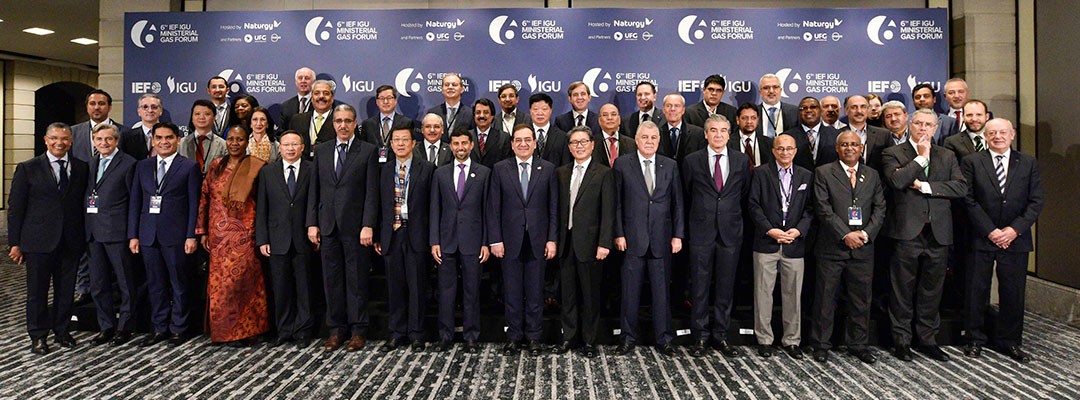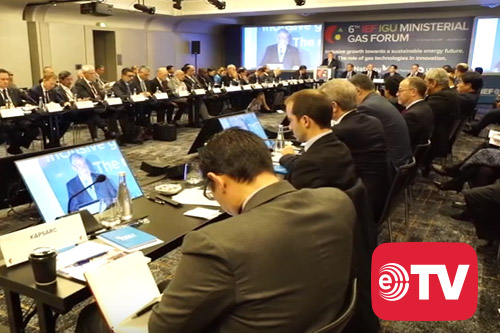6th IEF-IGU Ministerial Gas Forum
Barcelona, Spain
Ministers, Heads of International Organisations, Chief Executive Officers and public and private sector officials gathered at the 6th IEF-IGU Ministerial Gas Forum hosted by the International Energy Forum (IEF) and the International Gas Union (IGU) on 21-22 November in Barcelona, Spain. Delegates debated how gas market technologies and innovation contribute to inclusive growth and a sustainable energy future to achieve globally shared goals faster together.
Taking a Mediterranean perspective on gas market trends between Europe, the Middle East and North Africa, Asia Oceania and the Americas, discussions at the 6th IEF-IGU Ministerial Gas Forum were structured in three plenary sessions on:
- The Role of Gas Technologies in Resilient Low Carbon Energy Systems
- Gas Demand Growth Beyond Power Generation
- Enhancing Gas Supply Security and Diversification
The biennial IEF-IGU Ministerial Gas Forum aims to facilitate a constructive conversation among governments and companies from both producing and consuming countries on the potentials and risks in gas markets, and share a clear vision on what is needed to stimulate inclusive growth and create a sustainable energy future.

Photo: H.E. Mustapha Guitouni, Minister of Energy, Algeria presents on Gas Demand Growth Beyond Power Generation
New conventional and unconventional resources, pipelines and LNG technologies diversify gas trade and investment flows among world regions, and create a more abundantly supplied and competitive gas market environment. The value gas supply chains offer to consumers has steadily improved through technology advancements, cost reductions and efficiency gains, as a consequence. In the current setting, natural gas market functioning depends more on technology, innovation and effective supply chain management, than extraction or off-take requirements. New gas technologies and innovations in gas market development are also coming into sharper focus as the need for clean air in major cities and greenhouse gas emission reductions grow. While implementation of the 2015 United Nations Paris Agreement and Agenda 2030 Sustainable Development Goals requires sustained and stepped-up efforts globally, policy choices and investment decisions take on a different character in distinct energy market settings.
Taking place in the context of these new gas market trends that create significant new market opportunities and enable enhanced ambition for climate resilient development on the eve of the 24th UNFCCC Conference of Parties in early December 2018, the 6th IEF-IGU Ministerial Gas Forum will build on the dialogue among government and industry stakeholders. This will support well informed decisions in light of greater interconnectivity and more stringent energy and climate policy requirements. 
Photo: Head table including IEF and IGU Secretary Generals, H.E. Dr Sun Xiansheng, H.E. Luis Bertran Rafecas, IGU President H.E. Joe Kang and Session Moderators, Mr Adam Sieminski, Dr Ivan Marten and Dr Kamel Ben Naceur
Delegates noted that the importance of natural gas in achieving inclusive sustainable growth and successful energy sector transformations is more widely acknowledged. They highlighted that natural gas is critical to help keep global warming within tolerable limits and improve air quality in major cities, noting that in comparison to other fossil fuels, natural produces less greenhouse gas emissions, negligible sulphur dioxide and airborne particulate matter and very low nitrogen dioxide emissions, while supporting the greater deployment of renewable energies and integration of other sources.
Delegates called on government and industry leaders to build confidence by overcoming obstacles to gas market trade and cross border interconnections and foster stable and predictable conditions to accelerate the deployment of gas sector technologies such as Carbon Capture Use and Storage (CCUS), Hydrogen, modern gas sector infrastructure, including flexible and small scale Liquified Natural Gas (LNG) and explore synergies.

Photo: Delegates participate in Roundtable discussion at the 6th IEF IGU Ministerial Gas Forum
Co-dependencies between importers and exporters are increasingly governed by flexible arrangements in a currently well supplied market. Yet to boost stable and resilient gas markets long-term investment must accelerate over the next decade. Predictable and transparent market conditions including reliable price signals and regulation are vital to gas market security and trade flows in a more diverse and rapidly changing environment.
Delegates of the IEF-IGU Ministerial Gas Forum noted the progress made by the Joint Organisations Data Initiative (JODI) Gas initiative since JODI-Gas was launched in Moscow on 2014. Delegates welcomed the enhanced visibility of JODI-Gas data that is now also available on different major data re-distribution agencies (Argus, Bloomberg, and Thomson Reuters). As LNG trade increases, delegates recognised the need for improved granularity of LNG data available in the marketplace and called on JODI Partner Organisations to help achieve this goal.
Ministerial Documentation
Ministerial Videos
6th IEF-IGU Ministerial Gas Forum
Welcome Address and Opening Remarks
- Mr Francisco Reynés Massanet, Executive Chairman, Naturgy
- H.E. Joe Kang, President, International Gas Union
- H.E. Dr Sun Xiansheng, Secretary General, International Energy Forum
Keynote Speech
Panel Session 1: The Role of Gas Technologies in Resilient Low Carbon Energy Systems
The importance of natural gas in achieving sustainability and successful energy sector transformations is now more widely acknowledged. Natural gas supports the greater deployment of renewable energies and in comparison to other fossil fuels produces much less greenhouse gas emissions, and negligible sulphur dioxide and airborne particulate matter and very low nitrogen dioxide emissions, critical to air quality. The challenge for the future is how energy systems will evolve to meet greenhouse gas emission, and more stringent fuel quality standards while at the same time respond to growing demand for affordable access to reliable energy services. Governments and industry are sharpening focus on the technologies and innovations needed to capitalize on the environmental benefits gas offers for inclusive growth towards sustainable futures.
Moderator: Adam Sieminski, President, King Abdullah Petroleum Studies and Research Centre (KAPSARC)
- H.E. Suhail Mohamed Al Mazrouei, Minister of Energy and Industry, President of the OPEC Conference, United Arab Emirates
- H.E. Thembisile Majola, Deputy Minister of Energy, South Africa
- Mr David Carroll, President and Chief Executive Officer, Gas Technology Institute
- Mr Narendra K Verma, Managing Director and Chief Executive Officer, ONGC Videsh
- Mr Li Luguang, Vice President, Petrochina & President, Petrochina Exploration and Production Company
- Mr Jefferson Edwards, General Manager, Shell Energy Global Integration
- Dr Jochen Penker, IEF Representative of Austria, Federal Ministry for Sustainability and Tourism
Panel Session 2: Gas Demand Growth Beyond Power Generation
In 2017, global gas demand grew by almost 4% due to strong demand growth in Asia and Europe. While the outlook for gas is bright in view of its abundance, New infrastructure developments in Europe from the Baltic to the Mediterranean, rising North American LNG exports and Asian gas demand growth illustrate both the opportunities and hurdles that remain for the world to fully capitalise on the benefits that readily available gas resources and new and innovative technologies bring. The share of gas in the energy mix has remained largely unchanged until very recently as a consequence. In order to encourage the necessary investments in infrastructure and trade flows, there is a need to focus on pricing, cost, and acceptance issues to realise new growth potentials.
- H.E. Mustapha Guitouni, Minister of Energy, Algeria
- H.E. Dr Tawfiq E Chowdhury, Adviser (Minister) to the Prime Minister, Bangladesh
- H.E. Tarek El Molla, Minister of Petroleum and Mineral Resources, Egypt
- Mr Dominic Emery, Vice President Group Strategic Planning, BP
- Mr Manuel Fernández Álvarez, Chief Operating Officer Gas & Power, Naturgy
- Mr Olav Skalmeraas, Country Manager and Vice President, Marketing and Trading, Regulatory and Government Affairs, Equinor Deutschland
Panel Session 3: Enhancing Gas Supply Security and Diversification: New Sources and Markets
Producers and consumers cooperate to strengthen security of gas supply on international markets and benefit from greater resource availability and new market opportunities. This involves investment in gas infrastructure, ranging from pipeline systems, on land LNG terminals and floating facilities, cross-border and inland interconnections, as well as storage. Co-dependencies between importers and exporters are increasingly governed by flexible arrangements in the current well supplied market. Yet to boost resilient and healthy growth in Asia, or respond to the rising import dependencies in Europe, long-term investment must accelerate over the next decade. Predictable and transparent market mechanisms including reliable price signals and regulation will be required to enhance gas market security in a more diverse and rapidly changing environment.
Moderator: Dr Kamel Ben Naceur, Chief Economist, Abu Dhabi National Oil Company (ADNOC)
- H.E. Aziz Rabbah, Minister of Energy, Mines and Sustainable Development, Morocco
- Mr Safa Uslu, General Director of Foreign Relations and International Projects, Ministry of Energy and Natural Resources, Turkey
- Dr Houda Allal, Director General, Observatoire Méditerranéen de l'Energie (OME)
- Mr S Thangapandian, Chief Executive Officer, Essar Energy
- Mr Massimo Mantovani, Chief Gas & LNG Marketing and Power Officer, ENI
- Mr Francisco de la Flor, Director, International Organizations, Enagas
Concluding remarks
- H.E. Luis Bertran Rafecas Secretary General, International Gas Union
- H.E. Dr Sun Xiansheng, Secretary General, International Energy Forum
Details of the previous IEF-IGU Ministerial Gas Forums can be found below.
Previous Ministerials
- 5th IEF-IGU Ministerial Gas Forum
6 December 2016, New Delhi, India - 4th IEF-IGU Ministerial Gas Forum
11-12 November 2014, Acapulco, Mexico - 3rd IEF-IGU Ministerial Gas Forum
16 November 2012, Paris, France - 2nd IEF-IGU Ministerial Gas Forum
30 November 2010, Doha, Qatar - 1st IEF-IGU Ministerial Gas Forum
24 November 2008, Vienna, Austria













